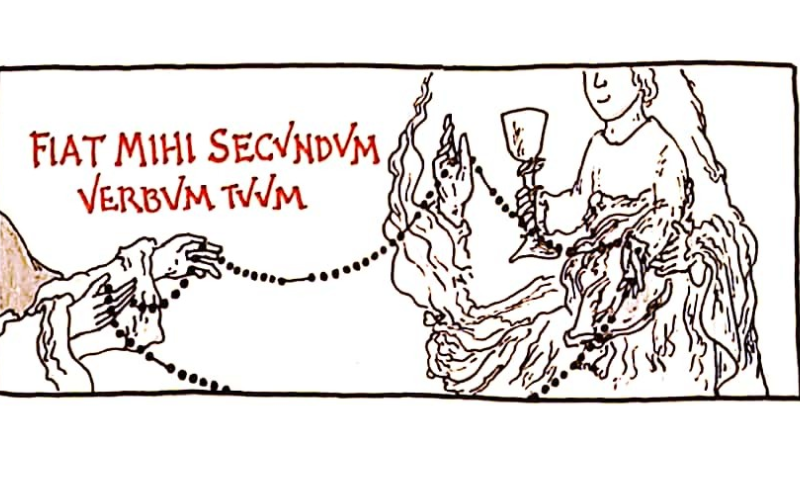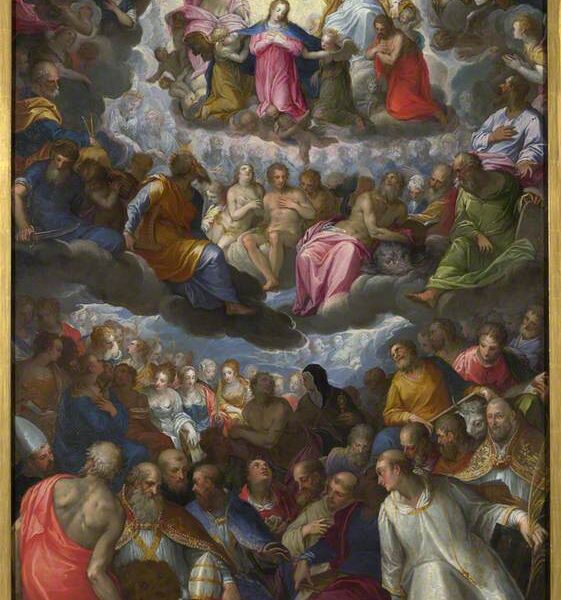
Why Sacramental Confession?
By Br Isaac Maria Wharton | A reflection on the importance of the sacrament of Reconciliation.
Personal and Private?
We are accustomed to thinking of sin in individualistic terms. Say I regularly entertain impure thoughts (I have chosen this sin deliberately because of its hidden nature). I know that I shouldn’t do it, and I know that it damages my relationship with Christ. I always try to be sorry for it and I always ask the Lord for forgiveness. Because my thoughts are private, no one else is hurt when my imagination gets the better of me. I return to the Lord and continue my struggle. In essence my sin is personal and private.
We can all agree that sin is deeply personal. It touches the deepest recesses of my soul, it changes the way I think about others (think of the times you have gossiped and notice how the subject of the gossip seems to become and more like you imagine them to be, the more you talk about them) and it hardens my heart. The scriptures are full of men and women who are, at least for a time, defined by their sin; Cain killed Abel (Genesis 4.8).
King David coveted Uriah’s wife, Bathsheba (2 Sam. 11:2-3), committed adultery with her (2 Sam. 11:4) effectively stealing her from Uriah (2 Sam. 12:9), lying to him (2 Sam. 11:12–13), and eventually having him murdered (2 Sam. 12:9). The woman was caught in adultery (John 8. 1-11), Paul the Apostle persecuted the Church of God and approved of the death of Stephen (Acts 7:54-8:2). But can we agree that sin is private? This is where it gets a bit more tricky, because the bible seems to suggest that my personal sin affects others. We mean this in two ways. First, there are obvious ways in which sin affects others. The actions of David and Bathsheba directly affect Uriah. Paul’s approval of the death of Stephen no doubt encouraged the murderous crowd. But there is a second way which sin affects others and it goes something like this: in the beginning, God created our first parents in love and unity. Made with personal integrity, they were directed towards each other, finding the fullness of their life and personality in the sincere gift of themselves to each other. Humanity had a natural unity.
Disintegration and exclusion
But the first sin changed this. They were set against each other; now understanding themselves to be at odds with God and with each other, they sought their own personal gain, blamed each other (Genesis 3. 12-14) and hid from God (Genesis 3.8). Worse, they discovered that their sin had affected them permanently (Genesis 3.16) leaving them enslaved to their desires; and perhaps most tragically of all, their children inherited their defect. So we meet original sin. If we return to the original condition of the human family, constituted in love and unity, we can see the real cost of original sin. Our humanity and our human relationships are scattered and torn asunder. The sin of one has affected all. Sin is not private, because we share a common humanity. Every sin is a sin against God, myself and all other human beings. Every sin reconfirms in my heart that we are at odds with each other. If our sin affects the natural unity of the human family, imagine what those sins do to the supernatural family of God – the Church. St Paul helps us here with the image of the Church as a Body (1 Corinthians 12-25). If one part suffers, every part suffers with it; if one part is honoured, every part rejoices with it. We might add, if one part sins, the whole body has sinned.
Reconciled and made one
The Church
Here we meet the need to confess our sins to a priest. We rightly think that the priest acts in persona Christi. When we confess our sins, we are speaking not simply into the ear of the priest, but into the ear of Christ. It is Christ who lovingly listens to our sins, Christ who speaks words of peace to us, and it is Christ who raises his wounded hands of forgiveness over us. It is Christ who raises us from the deathly drudgery of sin and who brings us home rejoicing to the Father’s house. But Christ does all of this through his priest. But the priest also acts in persona Ecclesiae, in the person of the Church. He acts as the one who receives us back into the communion of the Church, back into the life of the community, whom we have wounded by our sins. We need the personal, one-to-one, at times excruciating experience of confessing to the one’s we have hurt, in order to experience the abundant grace, freely given, generously poured out, of their forgiveness. In confessing our sins in this way, we see something of the commandment that we love God and our neighbour, and that we love ourselves. Lest we forget that sin hurts us, we often need to experience the forgiveness of others before we can begin to forgive ourselves.
So if that’s the case, can we just confess to other Christians? Why do we need a priest? The simple answer lies in the wisdom of God. When the disciples had disowned the Lord in fear and ran away, he entered into the locked door of their hearts, and spoke words of peace, forgiving them of their own sin. But in the next breath (quite literally) he gives them the power to forgive the sins of others (John 20.23). There are only two events in the Scriptures which speak to us of breathing upon someone. First there is the creation of Adam when God breaths life into his body and here is the new Adam giving the apostles the power to raise the spiritually dead.
That such power should be mediated should not shock us or alarm us. The bible is full of mediation. Abraham pleads before God to spare ten holy men in Sodom (Genesis 18.16-33). Moses intercedes on behalf of the rebellious Israelites (Numbers 1.14-25) and Elijah prays for the widow’s son, and through Elijah’s prayers God raises the young man from death (1 Kings 17.1-24). If we move to the New Testament, we see Jesus giving the apostles power over sickness and death (Matthew 10.1). We see Peter calling on the name of the Lord Jesus (Acts 3.6) to heal the lame man. We see Paul raising a man from death (Acts 20: 7-12) and see James instructing the Church to invite the priests to pray for the sick, so that their sins might be forgiven (James 5.15-16). None of us imagines that Abraham, Moses, Elijah, Peter, Paul or James did any of these things in their own power. Without Christ they could do nothing. Without Christ, a priest can do nothing. Without Christ, we can do nothing. But with Christ we can share in the saving work of God. God uses us because he wants to draw us into his work. He wants to reveal his glory in us. That is why Paul calls us co-workers with Christ (1 Corinthians 3.19).
So it is with the Apostles and priests, his forgiving power is mediated though his chosen instruments. Perhaps he does this because he knows that we need face to face encounters. Perhaps he knows it would be far too easy for us to hide from our sins, so he makes us dependent upon each other. Every service in the Body of Christ is given for the sake of every member, so the particular gift of the Priesthood serves all within the body. Just as Christ willed to heal the centurion’s servant through the prayers of his master (Luke 7.1-10) so now he wills to heal our sin through the ministry of his priests, to whom he has entrusted the ministry of reconciliation (2 Corinthians 5.18).
The real deal
Sin touches us very deeply. It teaches us to squander ourselves and our relationships until we have sold ourselves and others out for an easy price and at great cost. But here is the great secret of Christianity. Christ has entered into the fullness of sin and disintegration. He has confronted all that we could throw at him, and with divine love has conquered it all. In confession then we meet the convicting, consoling, conquering love of Christ, and with him we rise from the dead and join the company of those he has redeemed.
Sorry, the comment form is closed at this time.



A Website Visitor
Exceptional thinking. Don’t stop but exceed. You are exceptional.
A Website Visitor
Thank you for this thoughtful and enlightening text. May the Lord bless and make fruitful your predication.
A Website Visitor
Thank you for a profound, clear, and pastorally helpful exposition
A Website Visitor
Thank you for this – wonderful. I was excoriated in the correspondence columns of The Tablet some years ago for taking issue with a priest who argued that ‘General Absolution’ as in the Penitential Act of the Mass was sufficient for forgiveness of sin – reconciliation. I quoted Canon Law as to the special circumstances under which General Confession and Absolution are permitted [Canon 961-2 and 1483 of the Catechism] but to no avail. Personal confession was it seems pretty much ‘old hat’, by which I assume meant pre-Vatican II. I remained unconvinced.
A Website Visitor
Thank you so much for your amazing article! I had my first confession at 37 years old after converting from Protestantism. I would love to be a Dominican third order someday! Blessings! Joanna